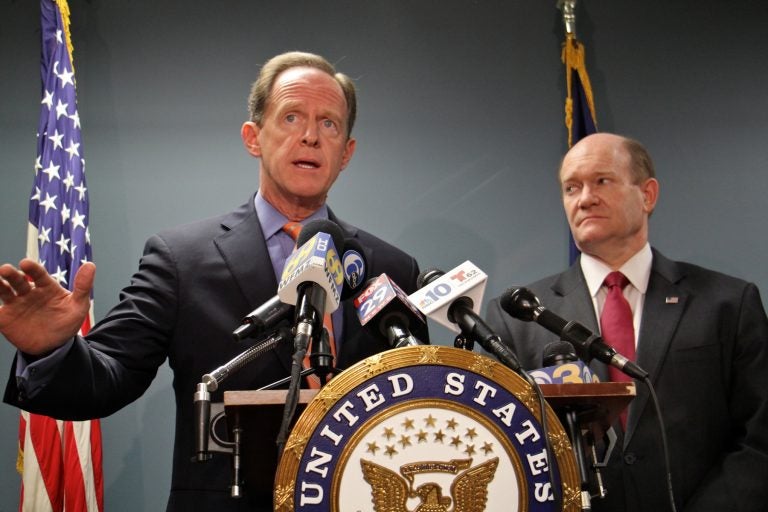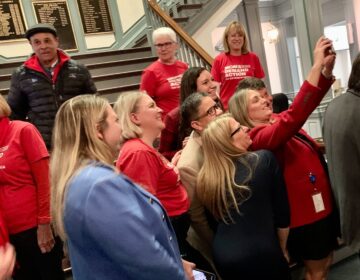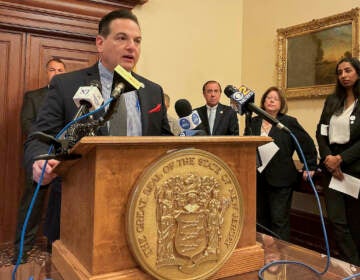Senators Toomey and Coons want FBI to alert states when potential gun buyer fails a background check
Convicted felons, fugitives, domestic abusers and others not legally allowed to buy guns try to do so anyway. They’re known as “lie and try” buyers.

U.S. Senators Pat Toomey and Chris Coons announce their gun legislation in Philadelphia, March 5, 2018. (Emma Lee/WHYY)
Convicted felons, fugitives, domestic abusers and others not legally allowed to buy guns try to do so anyway so often that law enforcers have a shorthand for them: They’re known as “lie and try” buyers.
But two federal lawmakers from opposite sides of the aisle are teaming up to stop them.
U.S. Sens. Pat Toomey, R-Pennsylvania, and Chris Coons, D-Delaware, announced new gun-control legislation Monday that they say will require federal authorities, who now just alert gun sellers to failed background checks, to also alert state law enforcement when someone prohibited from buying guns fails a check.
Thirteen states, including Pennsylvania, run their own background checks on the FBI’s National Instant Criminal Background Check System, known as NICS.
But 37 states (including Delaware) and the District of Columbia rely on the FBI to run some or all of their background checks — and the FBI isn’t required to alert those states when applicants fail the checks, the lawmakers said during a morning news conference at Toomey’s office in the U.S. Customs House in Old City.
Under the proposed NICS Denial Notification Act, the feds would have to alert states within 24 hours of lie-and-try buyers, or any failed checks.
Lying on gun background check forms is a federal crime punishable by up to 10 years in prison and a fine of up to $250,000. But the federal government rarely prosecutes offenders, Toomey and Coons said. By alerting states of lie-and-try buyers, the federal government is empowering states to investigate, prosecute or otherwise monitor them “for signs of future criminal activity,” Toomey said. About 400 lie-and-try buyers got prosecuted last year in Pennsylvania, Coons added.
“People who are willing to commit that crime of lying on their form in an attempt to buy a firearm who have a criminal conviction in their past: It’s not rocket science to think that maybe we ought to be a little concerned about this person. Maybe state law enforcement officials ought to know this,” Toomey said, adding: “Keeping our communities safe by enforcing existing law and responding to warning signs about criminal behavior should not be partisan. This should not even be controversial.”
The legislation also will require the federal Department of Justice to publish an annual report with statistics about its prosecution of background check denial cases.
In 2016, about 120,000 Americans prohibited from buying firearms tried to do so anyway and failed the NICS check, Coons said.
“It’s a terrific predictor of likely, imminent, illegal activity, if you’re willing to go in to a federally licensed firearm dealer and fill out a form that says: ‘I’m not a person-prohibited’ when you know you’re a convicted felon, you’ve been adjudicated mentally ill, you’ve been convicted of domestic violence,” said Coons, who co-chairs the Senate’s law enforcement caucus. “That person is much more likely, once denied, to go out and try to steal a firearm, to use a straw purchaser to illegally get a hold of it, or to go through a gun show or the internet, where there aren’t currently background checks required.”
Similar measures have been introduced in each of the past two years but didn’t make it to a vote.
But both men said they’re optimistic the bill will pass this year.
“My fervent hope is that this time really is different. Having heard from and met with a lot of high school students in recent weeks, and having seen, obviously on television, the Parkland, Florida, high school students, I think they have passion, a persistence and an engagement that this time hopefully will create a different environment in the Senate and the House,” Coons said.
President Trump, though, might prove to be more of a wild card.
“One of my concerns is that the President has engaged across a number of proposals, immigration most recently, now perhaps what to do about gun violence, where he initially welcomes a very broad range of proposals and ideas, only later to sharply narrow what he’s willing to sign,” Coons said.
Toomey was less worried.
“Legislation that can find 60 votes in the Senate is legislation that the President is very, very likely to support,” Toomey said. “We’ll see how it plays out.”
WHYY is your source for fact-based, in-depth journalism and information. As a nonprofit organization, we rely on financial support from readers like you. Please give today.




